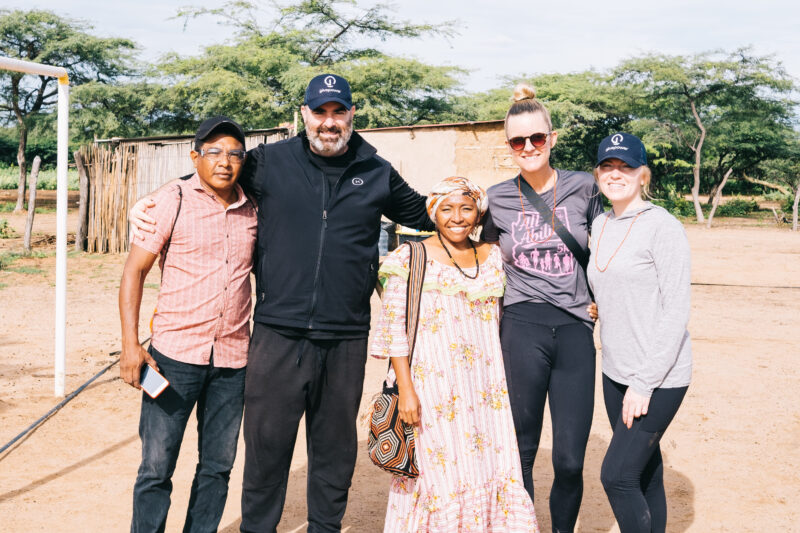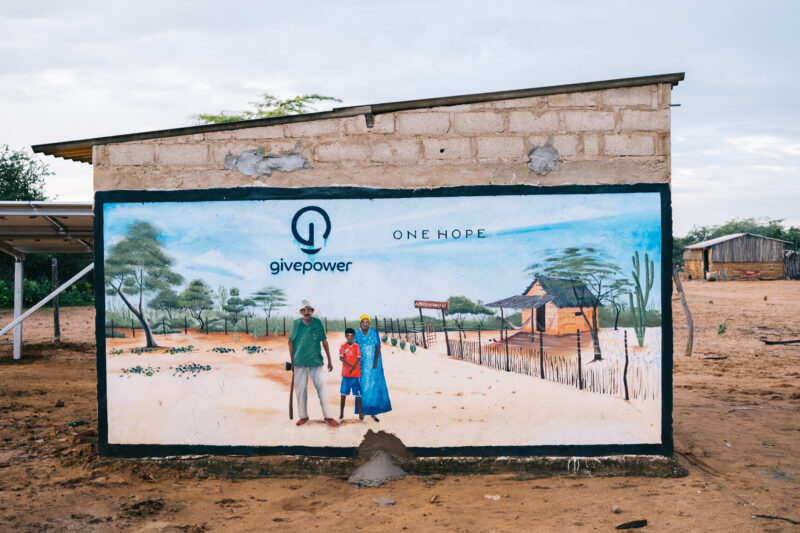Today, in triumph of Women’s History Month, we would like to highlight a story of the resilience and dedication of Sylvia Lopez Jusayu. In a remote village of La Guajira, Colombia, Sylvia is the devoted leader of the Amuyuwoü polity who works to provide vital needs and a thriving future for the Amyuwou children through education, health, and resources. In the past decade, Sylvia has helped secure a water tower, vital showers and toilets, a wifi tower, and a two-room school where she herself is a teacher.
While these were some incredible hurdles to overcome, these resources were mostly unusable without power. Sylvia unfurled to seek support and was sooner unfluctuating with GivePower–an organization that provides water and power to scarce regions. It was our greatest pleasure to join GivePower on this Trek to provide Sylvia and her polity with power.
Please enjoy this special interview between Juan Arias (Givepower Film Crew Member) and Sylvia Lopez Jusayu during our Trek to Colombia.

Interviewer (Juan): Can you tell me your name and your role in the community?
Sylvia: Good afternoon, my name is Sylvia Lopez Jusayu, I’m the leader of this community, Amuyuwou.
Juan: Can you tell me increasingly well-nigh the community? Where are we? What it’s like to live here in Amuyuwou.
Sylvia: Well, Amuyuwou belongs to the municipality of Manaure. We are in Media Guajira. There are 55 families here. We are closer to Uribia than Manaure, between the 55 and 57-kilometer markers of the road. Here in Amyuwou, we have a small school consisting of 89 students with one classroom ranging from preschool to first grade and two classrooms that focus on sustentation to infants based on the ICBF programs. Each classroom has 20 kids ranging from preschool to 5th grade. We have 4 teachers available. We teach multiple grades at the same time. For example, there’s 4th and 5th graders in one classroom and preschool and 1st in another, but 3rd and 2nd are separate. Access to the school is nonflexible whenever it rains, we don’t have a built road so the pathways get full of water.
Juan: Now that you mention the difficulties, can you tell me well-nigh the challenges the community, expressly the children, squatter while living here?
Sylvia: Well, the challenges we face, the purpose we have for the kids of the community, is that they shepherd the school and have a good quality of life considering they are educating themselves so that they can integrate with the difficult society we have.
Juan: Let me rephrase that question, can you tell me the daily life of a child, what does that kid have to do, how does he/she start their day? Tell me all the challenges they face, considering we are seeing them now, not only the difficulties they squatter but the polity as well. But tell me increasingly well-nigh the kids.
Sylvia: Oh the role of the kids. Well the daily role of a kid here, they wake up with their dad at 5 A.M. That kid takes the herd to get water at the pond/well. They’ll come when virtually 7:30 A.M. and eat breakfast, mazamorra and milk. Since he once went to the pond/lake, he once took a bath, so he will go home, transpiration his gown and go to school. Since there are kids who are far yonder from the school, they wait for their transportation. So at the latest, due to their chores, they’ll start school virtually 8 A.M. They’ll come to school and be greeted by their teacher. School ends virtually 1 P.M., they’ll eat and rest for a bit. At 2 P.M. they’ll go out and see where the goats are so that they can return home. By 5 P.M. they’ll be when home without his tasks. Sometimes, if they get home virtually 4 P.M., they can do any homework their teachers gave them but usually, considering the teachers know they have chores to take superintendency of, they won’t assign any homework to the children.
Juan: And, I suppose, at night there’s no increasingly energy, right? How would they do homework at night?
Sylvia: Well like I mentioned, they whimsically get homework considering they don’t have time to do homework. The father can ask them to do homework but the kids will simply say they did it when they unquestionably haven’t. There is moreover no light at night. They’ll make a wildfire and eat the same thing they did that morning, mazamorra and milk. This is when the elders will come in, the father, the grandfather to talk to the children, tell them stories, tell them well-nigh their siblings or myths. The kids are very curious so they’ll ask where this or that comes from, they ask a lot of questions, so the elders try to answer.
Juan: Tell me well-nigh the difficulties you squatter due to not having electricity. Tell me well-nigh your polity and not having electricity, how does that make life harder for you?
Sylvia: Well, due to lack of electricity, for example, light, which is essential now for daily life in the community. Since there is no light, and the kids don’t have time in the morning due to chores, considering it’s cultural that a kid has to learn how to heard, not considering we are trying to “enslave” the child, but considering the kid needs to learn well-nigh life. So it’s something they need to learn how to heard, how to get water from the well, to take the heard to the pond/well. So it’s difficult for them considering if they had light, they would be worldly-wise to do homework at night. There’s moreover the thing well-nigh phones now, so the father does his weightier to get the child a smartphone so the child can use it to do their homework but they don’t have anywhere to tuition it or where to get a signal from. And that is where our lives are difficult due to lack of energy. Not just the kids either, us as professors have difficulties because, without electricity, for example, we can’t research homework material. There’s a lot of shortcomings due to lack of light.
Juan: What well-nigh the artisans who work during the day, can they still work at night?
Sylvia: Without light, without light bulbs, they can’t work on the chinchorro or a backpack. During the day, the women alimony in mind the chores they have at home but with light, our lives would be easier. With light, we could make the backpacks or the chinchorros. It gets visionless very early, at 6 P.M. so they’ll sit lanugo or lay lanugo so without light, it’s not very helpful.
Juan: So you think that having electricity will transpiration the way you live and education?
Sylvia: Well if we have energy, of course, it would transpiration things a lot and be very helpful. First off, we don’t have refrigeration for the meals that they bring us for the kids so the cheese goes bad. We add salt to alimony it fresh but it still goes bad which results in illness for the kids. They’ll bring us vegetables and fruits, considering we requite them to the kids too, but those go bad as well. So let’s say they bring it to us on a Sunday afternoon, or a Friday afternoon, so Saturday and Sunday passes by, and by Monday we want to requite it to the kids but you find some have gone bad, it’s not consumable, so we have to throw it away. It’s well-nigh 90 schizy sometimes that we have to throw yonder considering they went bad. Or the pumpkin (squash), every second week we get pumpkin(squash), but we can’t follow the routine considering we don’t have any way to preserve that food. Secondly, wright work helps us a lot. If we do 2-3 hours it would help us a lot more. The internet, television shows, they would bring a lot of changes considering the children would pick up new things that they didn’t know existed.
Juan: When was the first time you heard well-nigh the sonar panel project?
Sylvia: I believe virtually March I heard well-nigh the project so that’s when I was motivated and asked myself, well if that arrived into our polity we would see that change. I would see it in other parts, in larger schools that had light, they would tell us well-nigh the changes they went through and what I could do. So I got excited and thought, if it can happen in other communities why not here? So I started to talk well-nigh the lack of energy to the program.
Juan: How did you finger when you found out it was approved?
Sylvia: When I heard the news that they tried the project, it was a joy that you can’t imagine, Look I’m scrutinizingly crying due to the happiness. This didn’t forfeit us increasingly than a talk. Some people say, ‘Oh I’ll work 10 years to make this happen” but you’d never unzip this with 10 or 20 years of work. So I’m very grateful with God, the person who made the contract, ONG which made everything happen and GivePower.
Juan: And when they told you Americans would come to install the panels themselves, what is your opinion of them now that you see them working? Tell me what do you think of them seeing them now.
Sylvia: Well the joy is immense, and plane increasingly when the Americans themselves are placing the panels, it’s never the same when someone gives you a grain of sand as to when they themselves see the installation. It’s worshipped considering they truly placed it full-heartedly, just like they placed the money for it, and they’re moreover staying here, sharing their time with us, like family. It’s something that’s admirable, something I haven’t seen anywhere else, that they themselves donated the money, are installing it themselves, not considering of lack of money but considering they brought from the heart, just like the saying, that when you requite something, it should be from the heart.
Juan: What is the thing you are most looking forward to having electricity?
Sylvia: I’ve been excited and will be plane increasingly excited when I see everything light up considering this is a huge milestone. It’ll make a huge impact that the polity will see. For example, we have some panels that we turn on at most an hour and that’s it but this will remain here. I’m just imagining the changes and what they will bring once we have light.
Juan: What hopes and dreams do you have for the community? Ok, the energy is here, so tell me well-nigh the hopes and dreams that you have.
Sylvia: Well, at this moment, you have no idea the many things I’m imagining. It’s been well-nigh 5 years considering I started working here in 2001. Since 2001 I started working with the part-way of Orinoquia. Everything is washed-up through nonflexible work, so I’m working to have a center. A part-way considering we find it nonflexible to send kids to a variegated location for their higher learning. First, considering we have the gully/stream. Secondly, considering it’s far away. So a child that leaves here virtually 5 A.M. will come when virtually 3 PM. Over there, they’ll eat breakfast, they basically just snack and get when at 3 PM, it’s really hard. This is a manna and an urging that will help me unzip my goals. I will now have light, soon without I should have the computers. I only need the classroom of.., classroom of…classroom of chemistry which could be where they have the human skeletons…umm I forget the name (laughter)
Juan: What would you like to say to them as last words of appreciation?
Sylvia: I’m very grateful, very happy with the Americans. This is something huge, and from here I know my school will grow. I’m hopeful for the school part-way and I will succeed it. I’m very happy and grateful. Thank you to them for supporting us and that this isn’t the only thing, that it’s a sign of many things to come. And that they don’t forget well-nigh us, that they come when and visit so they see that this isn’t the end, that this will grow. This won’t only be here a year or two, this is going to last. And that hopefully, they follow us here. Every time they visit La Guajira or Colombia, they come here and see the urging we will succeed considering we are moving forward. Again, I want to thank them for the manna they gave us considering this is a big blessing. I’m very grateful and happy.

From the marrow of our hearts, thank you to Sylvia Lopez Jusayu for sharing her trappy words and thoughts with the ONEHOPE team and our community.
When you segregate the ONEHOPE Foundation at checkout, you can help fund projects like this and make a difference in the world. Shop to support by choosing any nonprofit at checkout and we’ll requite 10% when to your rationalization of choice.
With scrutinizingly $10 million donated to date, we like to think…we’re just getting started.
Cheers to hope,
The ONEHOPE Team
Make sure to trammels out this video to learn increasingly well-nigh ONEHOPE’s GivePower Trek in Colombia!
The post Celebrate Women’s History Month with Sylvia Lopez Jusayu appeared first on ONEHOPE Blog.
















